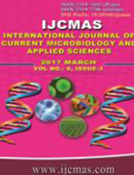


 National Academy of Agricultural Sciences (NAAS)
National Academy of Agricultural Sciences (NAAS)

|
PRINT ISSN : 2319-7692
Online ISSN : 2319-7706 Issues : 12 per year Publisher : Excellent Publishers Email : editorijcmas@gmail.com / submit@ijcmas.com Editor-in-chief: Dr.M.Prakash Index Copernicus ICV 2018: 95.39 NAAS RATING 2020: 5.38 |
To shift the paradigm from a passive tutor driven tutorials to more responsible active learning by the students, a cooperative teaching learning method could be a good alternative. The Jigsaw approach, a model of co-operative learning, focuses on learning in groups with fellow learner co-operation and reassures team work. Thus, this study was aimed at assessing the effectiveness of jigsaw strategy in comparison to tutorials in enhancing cognitive skills among the medical students in microbiology. A cross sectional study was carried out at microbiology department for 50 consenting MBBS phase II students. Students were randomly divided into two groups A and B of 25 students each. They were prepared for either a jigsaw (Experimental) or tutorial (Control) a week prior on pre-decided topics. The same groups were crossed over for another topic. Students performance was assessed by pretest, posttest, and academic achievement level and retention test by pre-validated multiple choice questionnaires. The student perception on TL methods was evaluated by using learning experience questionnaires. Post test scores of both groups was found to be significant at the level of P<0.05. Mean of post test scores in the jigsaw is more than tutorial (12.4 v/s 9.7, crossover 13.3 v/s 11.2). Mean retention tests scores and absolute achievement level were high in jigsaw groups. The students preferred jigsaw over the tutorial. Jigsaw strategy is a robust instructional tool, well perceived by the students to enhance cognitive skills as inferred by the results and can be tailored to the needs of varied topics across different disciplines.
 |
 |
 |
 |
 |